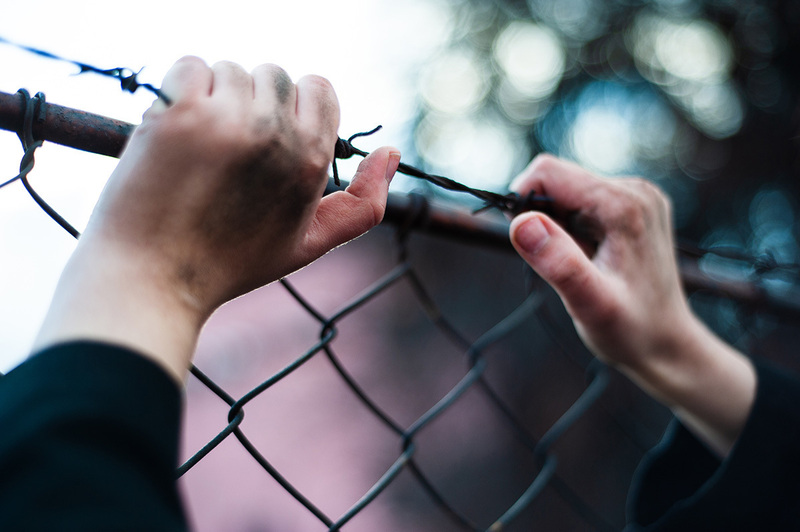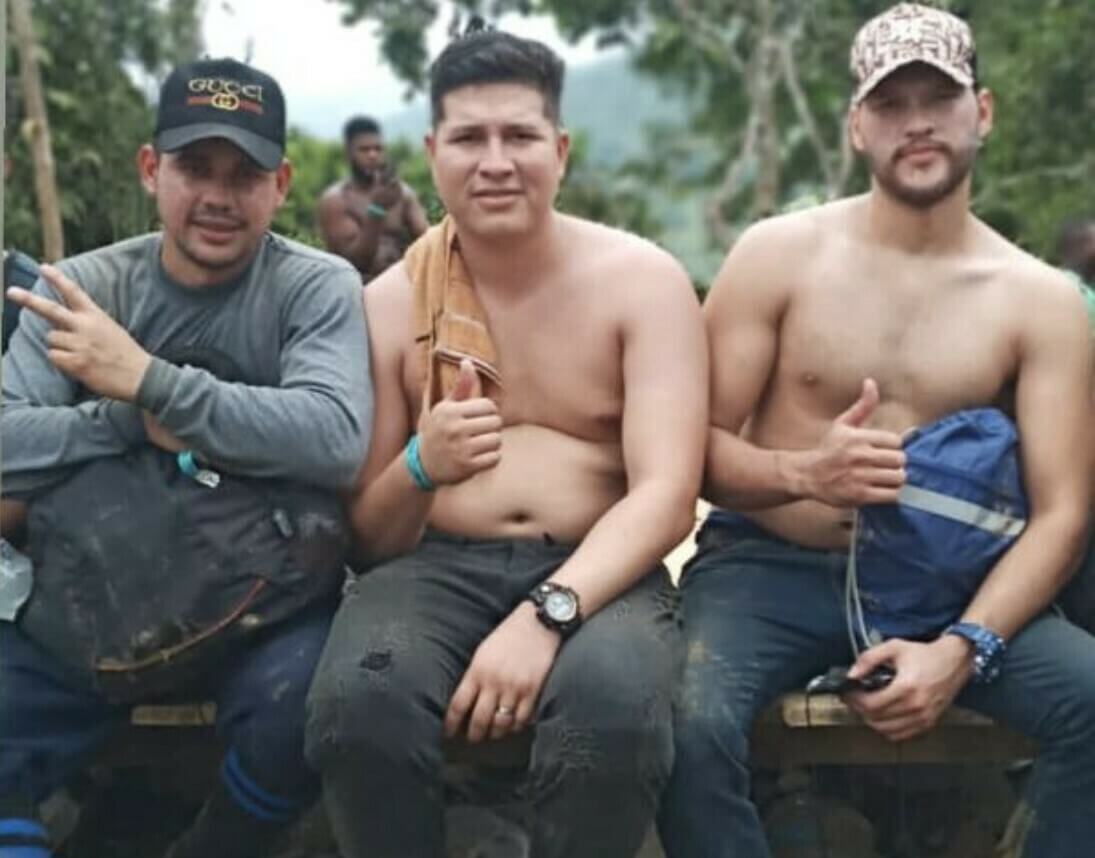
Editor’s Note: Father Joe Corpora, CSC, spent two weeks in June volunteering at the Humanitarian Respite Center led by 2018 Laetare medalist Sister Norma Pimentel, M.J. Corpora kept this journal of his encounters with immigrants arriving U.S.-Mexico border in Texas after dangerous, desperate journeys from their home countries.
Praying the rosary
I had an idea today. I thought, “I’m going to get on the loudspeaker and invite anyone who wants to pray the rosary to gather in front of the image of Our Lady of Guadalupe”— a beautiful painting at the entrance to the Humanitarian Respite Center.
I love the rosary because everyone can join in — the most educated to the least educated, rich and poor, young and old. You don’t have to be in a “state of grace,” whatever that is. You don’t have to go to confession first or be married in the Church to pray the rosary.
So many of the immigrants are from Latin America. Part of what unites all Latin American countries is a love for the Blessed Mother. I started the rosary and within moments, 21 people had gathered. I asked at the start of each mystery if anyone had an intention.
“I want to ask that my husband will be released from jail today.” (Everyone who crosses the border via the river goes to jail for a few days).
“I would like to pray for children who have made this trip.”
“I want to thank la Virgencita for covering us with her cape every day and every night of the trip from Honduras.”
“I want to pray in gratitude that my family and I got here safely. Tonight, for the first time in months, we will sleep well, under a roof and not outside, worried for what could happen to us in the night.”
After each intention at the beginning of each mystery, I would have to fight tears. And at the end of the rosary, I intoned a very common Marian hymn from Mexico hoping that it was common to Latin America. And it is. The hymn “O Maria, Madre Mia, O Consuelo del mortal . . . ” “Oh, Mary, my Mother, Hope for Us Mortals . . .” A really beautiful hymn. I don’t know why I didn’t think about praying the rosary sooner. It’s a no-brainer. I will make it a point to pray the rosary every day at the Center from now on.
The Darien Gap
I spent a long time today talking with Juan Carlos Martinez Medina from Colombia. He arrived yesterday with his wife (five months pregnant) and 3-year-old son.
Their trip, like that of so many people, was beyond what most of us can imagine. Robberies, rape, hunger, extortion. Repeat. Juan Carlos told me that the cartels in his own country raped his wife in front of him. They handcuffed him and made him and his son watch as they repeatedly raped his wife. He has bruise marks everywhere from being beaten along the way. He has two bullet marks in one leg.
How can this be? How can human beings do this to other human beings?
When people talk about the journey from South America to the north, they always talk about the four-day trip through the jungle from Colombia to Panama. It’s called the Darien Gap. The immigrants refer to it as the jungle of death. Take a moment to google it. You’ll quickly know why they call it the jungle of death. You can hardly believe that in 2023, 400,000 people will try to make the crossing.
Juan Carlos told me that many die along the way. Some are eaten alive by animals. There are dead babies and children and old people all along the way. People fall hundreds of feet from mountains to their deaths.
They trek through swamps and rivers, mountains and hills. For those who survive, the trip seems endless. After two days, Juan Carlos and his family ran out of food. He told me that, to stay alive, people eat food left behind from those who have died.
He wanted to return to Colombia many times while going through the Darien Gap. And even in the Darien Gap, there are cartels trying to steal your money or your children or whatever they can take. He explained to me how immigrants hide their money. I can’t even put it in writing.
Juan Carlos described the situation where they tried to steal his 3-year-old son. The cartels try to rob children that young, and younger. They kill them and then sell their body parts. Tapachula is in Mexico on the border between Mexico and Guatemala. It is super dangerous and known to be a terrible part of the trip.
How can human beings do these things to other human beings? Beat them. Rape them. Steal from them. Kill them. Rob them. Again, and again.
No wonder when they arrive to Sister Norma’s Center, they just relax and feel safe. They don’t have to tie their children to them. They don’t have to sleep on top of everything that they have. They can sleep and not worry about being awakened by an animal or someone from a cartel trying to rape them or steal their child.
Juan Carlos and his wife and 3-year-old son were at the Center for eight days. The person who was going to pay their way to Chicago is unable to do so. They have no money. In conversation with Juan Carlos, we decided that it would be best to take the bus to New York that Gov. Greg Abbott uses to move immigrants out of Texas, then get a bus to Chicago.
When he and his wife and son got on the bus to New York, though I was happy that they could continue their journey, I was sad. We had visited every day for the eight days that he was there. I got to know him and his wife and son, Emanuel. I prayed that they would arrive safely to New York, find their way from the Greyhound bus station to the Port Authority and then on to Chicago.

I met a saint
Today I met a saint. A real saint. She didn’t look like any saint that I had ever seen before. She didn’t have a veil. She didn’t have a flowing robe of any sort. She had very old and worn clothing. She looked like she hadn’t brushed her hair for days. She didn’t have the rosary in her hand because both hands were pushing a grown man in a wheelchair when she entered the center. The man was developmentally disabled. She came to the “farmacia” to ask if we had adult diapers. Luckily, we did. I asked the saint if her son could get out of the wheelchair to go to the bathroom. She said that she could help him to stand up, but that he would immediately fall.
This saint had pushed her son in his wheelchair from somewhere in Central America, relying upon the help of people all along the way. They offered rides. They helped push the wheelchair.
You could tell that she didn’t think of what she had done as anything heroic. She was trying to come to the United States, where she could get better medical care for her son. Soon after she arrived she got in line for the free bus to New York.
So, there she is pushing his wheelchair on to the bus lift to start the journey to New York holding a bag with everything that the two of them owned.
Jesus laid down his whole life for us. This mother has done the same. She has laid down her whole life for her son.
O, Mother of the Developmentally Disabled Son, whom you have loved every second of his life, and for whom no sacrifice is too great, pray for us.
There’s enough
At the counter of the “farmacia,” people ask for what they need. One day two women got into a shouting match about who was in line first. They both wanted powdered milk for their babies. They began yelling at each other. I was afraid that a fist fight would break out.
I said, “There’s enough milk for everyone. There’s enough milk.” Things settled down. When the second lady came up to the counter she said, “Thank you for the milk. I have never been anywhere where there is enough for everyone. I have had to fight for everything, and I have tried to get it before it would run out. We don’t know what it’s like in Haiti for there to be enough milk or rice or beans or bread for everyone. So, we just fight to get what we can.” It certainly put things in perspective for me.
Even though I fully believe that God is a God of abundance and generosity, I suppose that it would be hard to believe that if I were regularly in situations where there was not enough.
There’s enough for everyone. There certainly is enough of God’s love for everyone.
At a loss
I have absolutely no idea — none — what it is like to have no money in my pocket. No idea. If I don’t have money, I just go to an ATM. I can’t imagine the life experiences of many immigrants. Juan Carlos doesn’t have any money. Not a dime. What will he do when he gets to New York? How will he and his wife and child eat? I just can’t imagine what it’s like to have no money in my pocket.
There are no words to describe how hopeless I feel as our country prepares for another election. Hopeless. We are lost, completely lost, as a nation. And worse than being lost is that we don’t even know that we are lost. And were we to know it, I think that we have lost the will to be led back to a worthy way of life.
And here is the irony of it all: There is no doubt in my mind that the people who could help us find our way are immigrants, the very people that we are set on not welcoming.
May God have mercy on us.
Father Joe Corpora is associate director of the Transformational Leaders Program. He is a priest-in-residence at Dillon Hall and one of 700 priests whom Pope Francis appointed in 2016 to serve as Missionaries of Mercy. His most recent book about this latter experience is Doing Mercy: A Path to Contemplation.